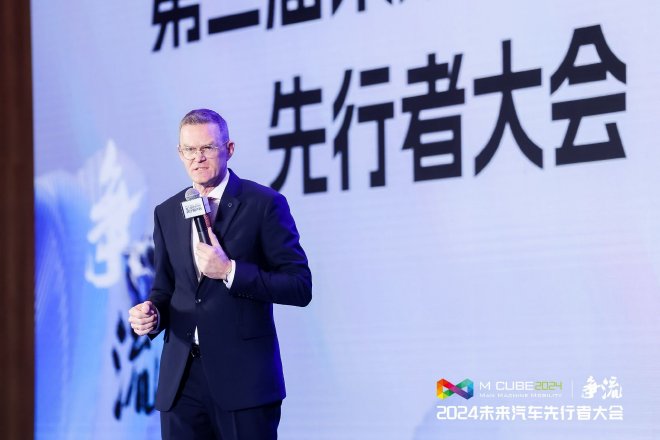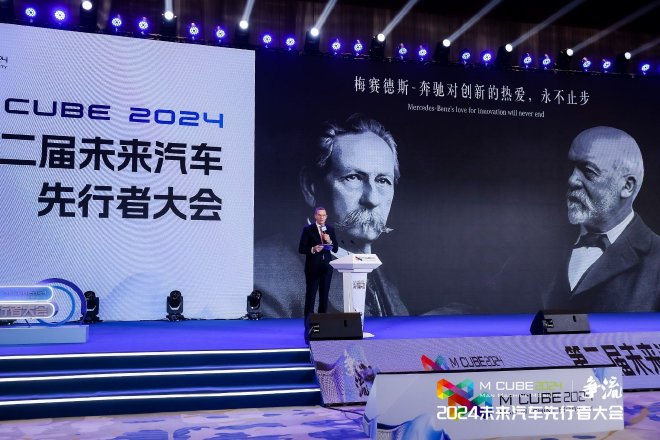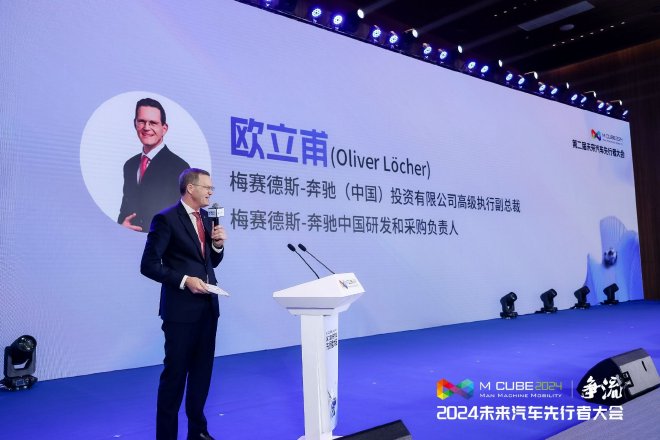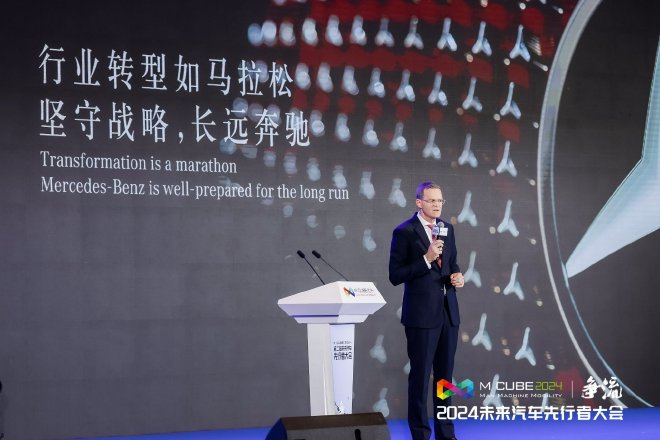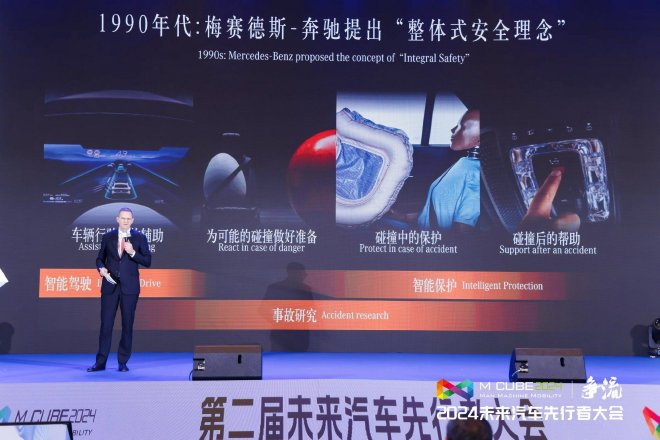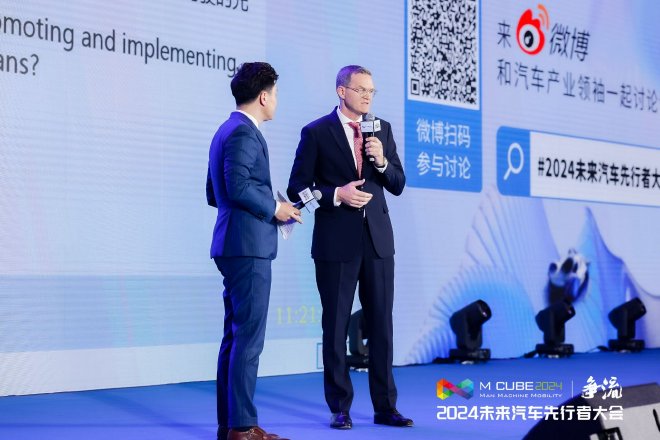At the “Future of Automotive Conference” today, Olli Fup, Senior Executive Vice President of Mercedes-Benz Investment Limited, shared Mercedes-Benz’s story of sustainable business success through innovation and future vision. Here are some key points from Fup’s speech:
Mercedes-Benz China R&D and Purchasing Director Dear leaders, colleagues, ladies and gentlemen, dear media friends, good morning everyone! Thank you to the organizers for bringing together so many top players in the automotive industry. As the founder of a luxury car brand, Mercedes-Benz has a saying: Never stop the passion for innovation! Today, discussing the future of cars in Shenzhen, the city of innovation, is very appropriate! Shenzhen has achieved success with companies like BYD, Huawei, Tencent, known for their rich innovation and fast pace. Therefore, to communicate more effectively, I will speak in English!
I want to share with you the story of Mercedes-Benz achieving sustainable business success through innovation. Let’s go back to 1886. In a garage near Stuttgart, Gottlieb Daimler invented the first high-speed internal combustion engine after countless attempts and experiments. Almost simultaneously, Karl Benz invented the first car. At that time, the public was not enthusiastic about this groundbreaking technological innovation. Some even said, “We believe that cars will only be a passing fad.” However, as we have seen, this innovation that meets the basic human transportation needs has been unstoppable. These two pioneers later founded Mercedes-Benz, laying the foundation for the new automotive industry. Cars changed the world and brought tremendous benefits to society. However, even after years of relentless engineering efforts and significant improvements in infrastructure, over 1 million people still die in traffic accidents globally every year. The increasing number of cars on the road is also having a growing impact on the earth’s environment. Therefore, Mercedes-Benz’s future innovations are guided by two principles. Firstly, in line with the “Vision Zero” concept, our goal is to achieve “zero fatalities in traffic accidents” by 2050, with plans to reduce the number of traffic accident deaths and serious injuries by half by 2030 compared to 2020.
Next is the “2039 Vision”. The goal is to achieve net carbon neutrality in the entire value chain and the entire lifecycle of passenger car new products by 2039 at the latest. 138 years have passed, the pioneering spirit of the founders of Mercedes-Benz still deeply influences us. We have a strong foundation and grand dreams. As Gottlieb Daimler said, “Only the best”. Mercedes-Benz has always been consistent. Why? Because of the “Mercedes Standard”: classic design, quality, safety, comfort, and intelligence. From the first day of the company’s establishment, we have been committed to providing customers with reliable cars, with safety standards even stricter than industry and regulatory requirements. In the 1950s, Bela Barenyi, known as the “father of car safety”, invented the safety body with crumple zones and a rigid passenger compartment at Mercedes-Benz, patented it, and completely changed the safety standards of the entire automotive industry.
In the 1960s, we started safety research on real accidents to ensure “real-life safety”. Since then, our research team has analyzed over 5,000 real accidents, constantly evaluating and improving our safety systems. Since the late 1990s, we have upheld the “integrated safety concept” that combines active and passive safety. Currently, we have over 40 active driving assistance systems to ensure maximum safety for all road users. Today, every new Mercedes-Benz model undergoes approximately 15,000 simulated crash tests and over 150 real crash tests before production. Each new car undergoes global durability testing of 5 million kilometers, equivalent to 6.5 round trips to the moon. We ensure that any technology we release meets our rigorous standards. In short, our cars are durable. For example, after 45 years, up to 80% of G-Class cars are still on the road. You can always trust the Mercedes-Benz standard! In recent years, we have been experiencing the largest industry transformation since the invention of the automobile. These transformations are driven by computing power, intelligent connectivity, and electrification. We are actively embracing these rapidly developing new technologies. For us, this is an opportunity to accelerate the achievement of the goals of “net carbon neutrality” and “zero fatal traffic accidents”. We have 20,000 experienced and passionate top research and development engineers worldwide working on future products – just last year, we invested over 78 billion RMB.
We have research and development teams in China, Germany, the United States, and India, making full use of the unique advantages in each region. China is a dynamic market with a tech-savvy user base that leads and drives the global trends in automotive digitalization and electrification. We believe China is leading the future trends in global automotive development. Our research and development network in China is accelerating research in artificial intelligence, vehicle-road coordination, and autonomous driving. The China Research and Development Technology Center in Beijing and the Shanghai Research Center are our “dual innovation engines” in China. We are expanding our research and development investment in China, with over 2,000 research and development talents. The Chinese research and development team is the core force of our innovation, especially as we enter a new phase of “innovating in China, leading global trends.” For example, the L2+ navigation assistance driving system went from project initiation to implementation in just 12 months, faster than the industry average. The speed of China is crucial for Mercedes-Benz innovation. The strong infrastructure built in China over the past few decades has always impressed me. The network of airports, highways, and high-speed railways is driving the country’s development. MB.OS is the infrastructure that accelerates our innovation, bringing customers a new luxury digital experience. Through MB.OS, we are building a highly flexible architecture from chips to the cloud, decoupling hardware and software for rapid updates in all four major functional domains: intelligent cockpit, autonomous driving, vehicle comfort, and driving and charging. The Chinese R&D team is a key contributor to the global MB.OS team. The high flexibility of MB.OS allows easy integration of content loved by Chinese customers. In addition to enhancing internal R&D capabilities, we collaborate extensively with leading global tech companies. Partnerships include Google and NVIDIA on a global scale, as well as Tencent and specialized tech companies like Mobileye in China. Our next-generation autonomous driving system combines large-scale models with cutting-edge hardware. This enables end-to-end assisted driving in urban and highway conditions. With a focus on safety, the system acts like a “reliable old driver,” providing a seamless and comfortable experience. In 2021, Mercedes-Benz obtained the world’s first international certification for an L3 conditional autonomous driving system in Germany, followed by certifications in two states in the United States. These systems improve driving comfort and support our vision of “zero fatal traffic accidents.” Within this year, we will further enhance our mature L3 highway autonomous driving system. We have obtained testing licenses in Beijing and aim to bring it to Chinese customers soon. It is important to highlight our commitment to user privacy and data security in the digital transformation process. To ensure data security, we are the first automotive brand to apply “federated learning technology,” commonly used in the financial industry. With continuous upgrades in autonomous driving capabilities and the launch of MB.OS, we are accelerating innovation and striving to define the trend of “digital luxury.”
For the “2039 Vision,” we see more opportunities in China, the world’s largest new energy vehicle market. We believe efficiency is key for electric cars. The less cars consume, the less power is needed for production, transmission to charging stations, and storage in batteries. We are improving Mercedes-Benz’s performance in this specific market. You can get a glimpse from the CLA concept car based on the Mercedes modular platform. The CLA concept car is equipped with the first Mercedes-developed electric drive unit – MB.EDU, with a two-speed gearbox. The two gears ensure the highest efficiency in city and highway conditions. Our goal is an energy consumption of about 12 kWh per 100 kilometers, equivalent to the “1 liter car” in the electric era. The 800V electrical architecture integrates high energy density batteries, minimizing weight. Additionally, it has excellent charging performance – adding 400 kilometers of range in just 15 minutes of charging. We are accelerating the construction of fast charging facilities in China. The first batch of Mercedes-Benz supercharging stations has been put into use in some major new energy vehicle cities nationwide. Our goal is to build at least 1000 supercharging stations with around 7000 supercharging poles by the end of 2026. Regarding batteries, we are partnering with leading battery companies such as CATL and investing in emerging solid-state battery technology companies such as SilaNano and Factorial Energy. We are continuously improving our in-house research and development in the battery chemistry field, aiming to cover all battery technology areas. In addition to the comprehensive new energy testing laboratory in Beijing, we will soon establish eCampus in Germany, including facilities for testing and experimenting with next-generation batteries. Apart from performance and weight, we adhere to the “design for recycling” concept during the development phase. This reflects that recycling and reuse are important components of responsible resource strategies.
